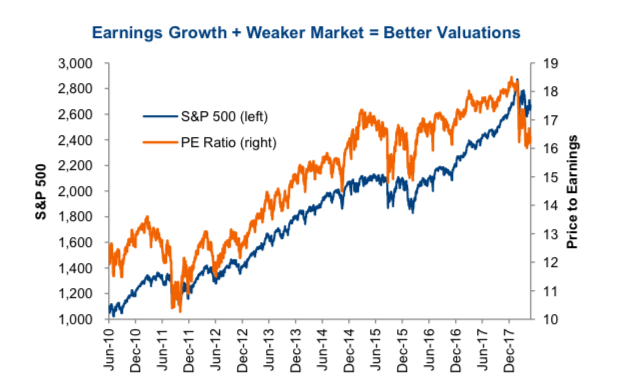Why Strong Corporate Earnings Might Not Last

Table of Contents
The Impact of External Economic Factors on Corporate Earnings
External forces exert considerable influence on a company's bottom line, often unexpectedly undermining even the most robust financial performance. Understanding these external pressures is paramount when evaluating the sustainability of strong corporate earnings.
Inflation and Rising Interest Rates
Inflation and rising interest rates create a perfect storm that can severely impact profitability. These economic headwinds affect businesses in several ways:
- Increased production costs: Higher prices for raw materials, energy, and labor directly reduce profit margins.
- Reduced consumer demand: As prices rise, consumers tighten their belts, leading to decreased sales and revenue.
- Higher borrowing costs for businesses: Increased interest rates make it more expensive for companies to finance operations and expansion, hindering growth.
For example, the surge in energy prices in 2022 significantly impacted manufacturing companies, squeezing profit margins and forcing some to pass increased costs onto consumers, further dampening demand.
Geopolitical Instability and Supply Chain Disruptions
Global events can wreak havoc on even the most meticulously planned supply chains. Geopolitical instability introduces unforeseen risks that directly impact corporate earnings:
- Increased transportation costs: Trade disruptions and sanctions can lead to significantly higher shipping costs.
- Material shortages: Conflicts and political instability can disrupt access to essential raw materials.
- Sanctions and trade wars: These actions can severely limit access to key markets and suppliers.
The war in Ukraine, for example, dramatically impacted global energy markets, leading to increased prices and supply shortages that rippled through numerous industries.
Changes in Consumer Behavior and Spending Habits
Consumer preferences are dynamic and unpredictable. Shifts in buying patterns can quickly erode revenue streams, rendering even the strongest corporate earnings short-lived:
- Rise of e-commerce affecting brick-and-mortar stores: The continued growth of online shopping continues to put pressure on traditional retail businesses.
- Changing consumer priorities (e.g., sustainability): Consumers are increasingly conscious of environmental and social issues, favoring sustainable and ethically sourced products.
- Increased savings rates: Economic uncertainty can lead to consumers saving more and spending less, impacting sales across various sectors.
The growing demand for sustainable products, for example, has forced traditional manufacturing companies to adapt or face declining market share and reduced profitability.
Internal Factors Contributing to the Short-Term Nature of Strong Earnings
While external factors play a significant role, internal vulnerabilities can also undermine the sustainability of strong corporate earnings.
One-Time Events and Accounting Practices
Sometimes, strong corporate earnings are artificially inflated by one-time events or aggressive accounting practices:
- Asset sales: The sale of non-core assets can boost short-term earnings but doesn't reflect sustainable growth.
- Changes in accounting standards: Changes in accounting rules can temporarily impact reported earnings.
- Stock buybacks: While boosting earnings per share, buybacks can deplete cash reserves needed for future investments.
A company might report exceptionally high earnings due to a one-time asset sale, creating a misleading impression of sustained growth.
Increased Competition and Market Saturation
Intense competition and market saturation can rapidly erode market share and profitability:
- New entrants: New competitors disrupt established markets, forcing price wars and reducing profit margins.
- Disruptive technologies: Innovative technologies can render existing products and services obsolete.
- Price wars: Aggressive pricing strategies can damage profitability in the long run.
The streaming industry, for instance, is characterized by intense competition, leading to price wars and reduced profitability for many players.
Lack of Innovation and Adaptation
Companies failing to adapt to changing market conditions often experience a decline in earnings, regardless of past successes:
- Failure to embrace new technologies: Ignoring technological advancements can lead to obsolescence and lost market share.
- Resistance to change: Inertia and resistance to change can stifle innovation and hinder growth.
- Outdated business models: Business models that fail to adapt to evolving consumer needs and market dynamics are unsustainable.
Companies that fail to innovate and adapt to changing consumer demands risk becoming irrelevant and experiencing a sharp decline in earnings.
Analyzing Corporate Earnings Reports Critically
Relying solely on headline numbers is risky. A thorough analysis is crucial to understand the true picture of a company's financial health.
Beyond the Headline Numbers
Don't just focus on the top-line revenue figures; dive deeper into key performance indicators (KPIs):
- Gross margin: Indicates the profitability of a company's core operations.
- Operating income: Shows profitability after operating expenses are deducted.
- Free cash flow: Represents the cash generated by a company's operations.
- Debt levels: High debt can indicate financial instability.
Learning to interpret these metrics and identify potential red flags is essential for informed investment decisions.
Understanding the Sustainability of Growth
Assess the long-term viability of a company's earnings growth by evaluating:
- The company's business model: Is it sustainable and adaptable to changing market conditions?
- Competitive advantages: Does the company possess a strong competitive edge?
- Growth strategies: Are the company's growth strategies realistic and well-defined?
Thoroughly researching a company's management team and their track record is crucial for understanding the sustainability of their earnings growth.
Conclusion
Strong corporate earnings, while promising, are not a guarantee of future success. External economic headwinds, internal vulnerabilities, and the inherent unpredictability of the market can quickly turn impressive financial results into a temporary phenomenon. Understanding the factors influencing profitability—from inflation and geopolitical instability to internal competition and a lack of innovation—is crucial. Critically analyzing corporate earnings reports beyond the headline numbers, focusing on key performance indicators and the long-term sustainability of growth, is paramount. Diversify your investments to mitigate the risks associated with relying on seemingly strong corporate earnings. Remember, the market is dynamic and unpredictable; cautious financial decision-making is essential for long-term success. Don't be fooled by fleeting displays of strong corporate earnings; look beyond the surface and assess the complete picture before making any investment decisions.

Featured Posts
-
 Afvisningens Skygge Holder Vejret Og Danmarks Skaebne
May 30, 2025
Afvisningens Skygge Holder Vejret Og Danmarks Skaebne
May 30, 2025 -
 Carlos Alcarazs Monaco Triumph A Hard Fought Victory
May 30, 2025
Carlos Alcarazs Monaco Triumph A Hard Fought Victory
May 30, 2025 -
 Politsiya Izrailya Srochnoe Preduprezhdenie Ne Pokidayte Doma
May 30, 2025
Politsiya Izrailya Srochnoe Preduprezhdenie Ne Pokidayte Doma
May 30, 2025 -
 Jack Draper Reaches First Atp Clay Court Final In Madrid
May 30, 2025
Jack Draper Reaches First Atp Clay Court Final In Madrid
May 30, 2025 -
 Alcaraz Claims Monaco Crown After Thrilling Rally
May 30, 2025
Alcaraz Claims Monaco Crown After Thrilling Rally
May 30, 2025
